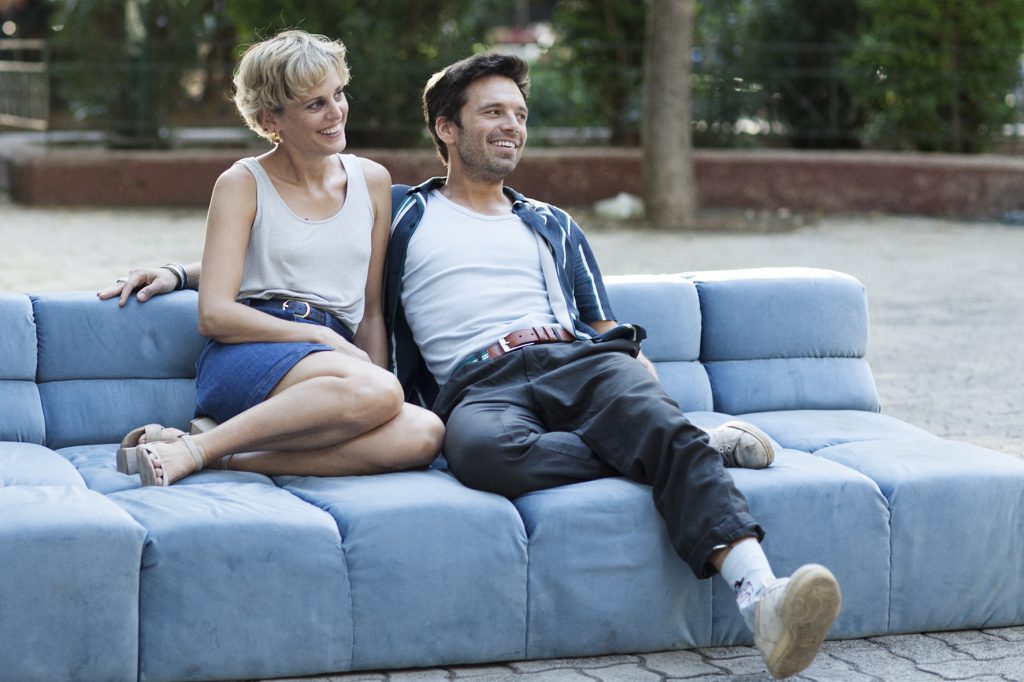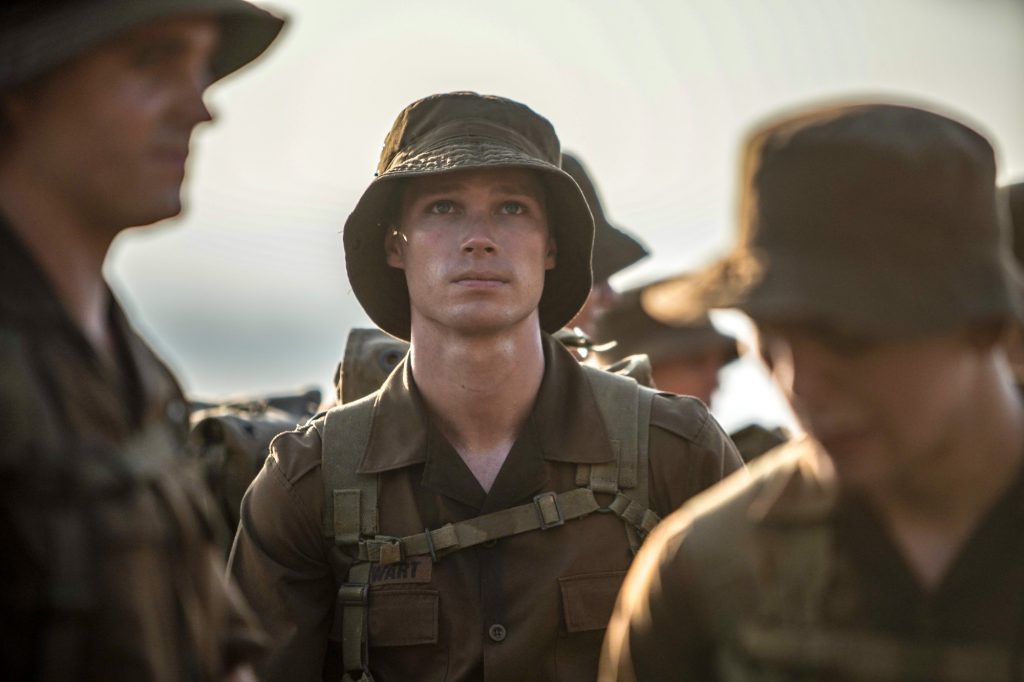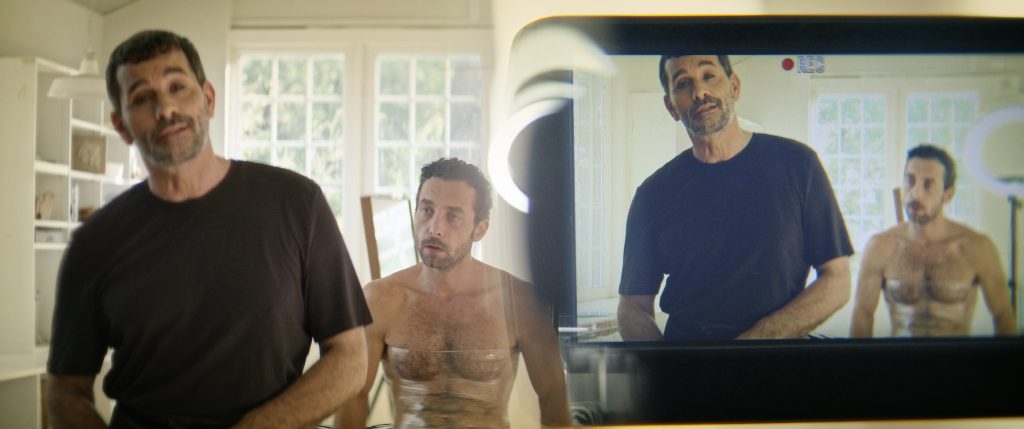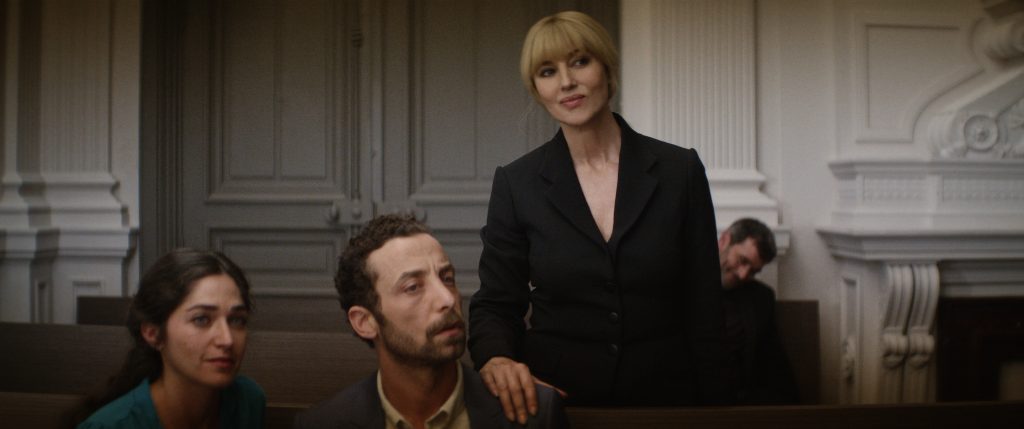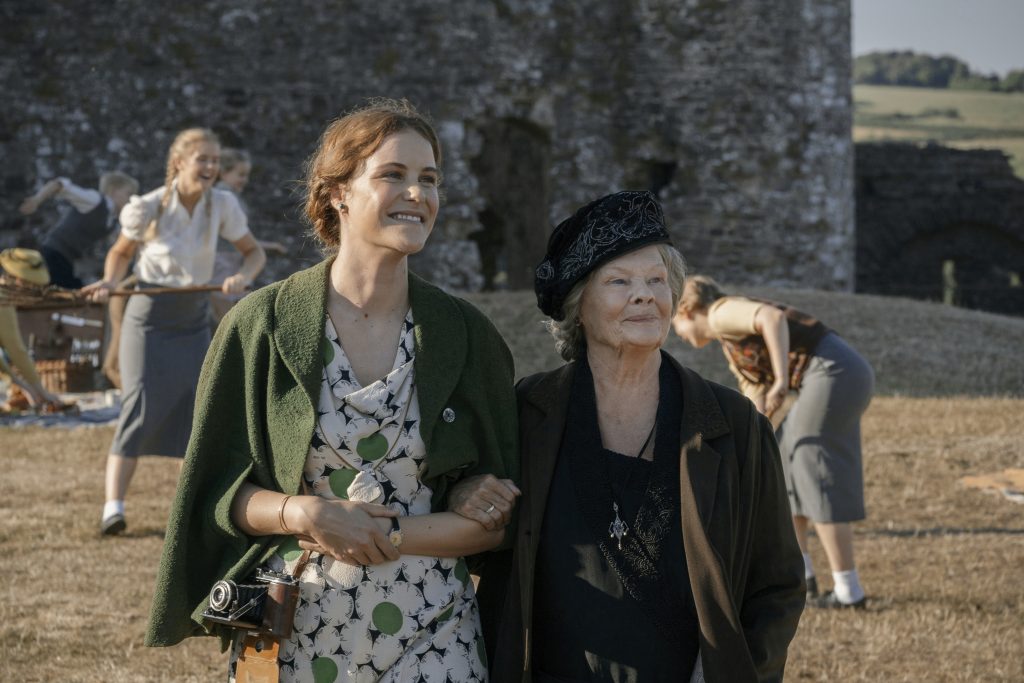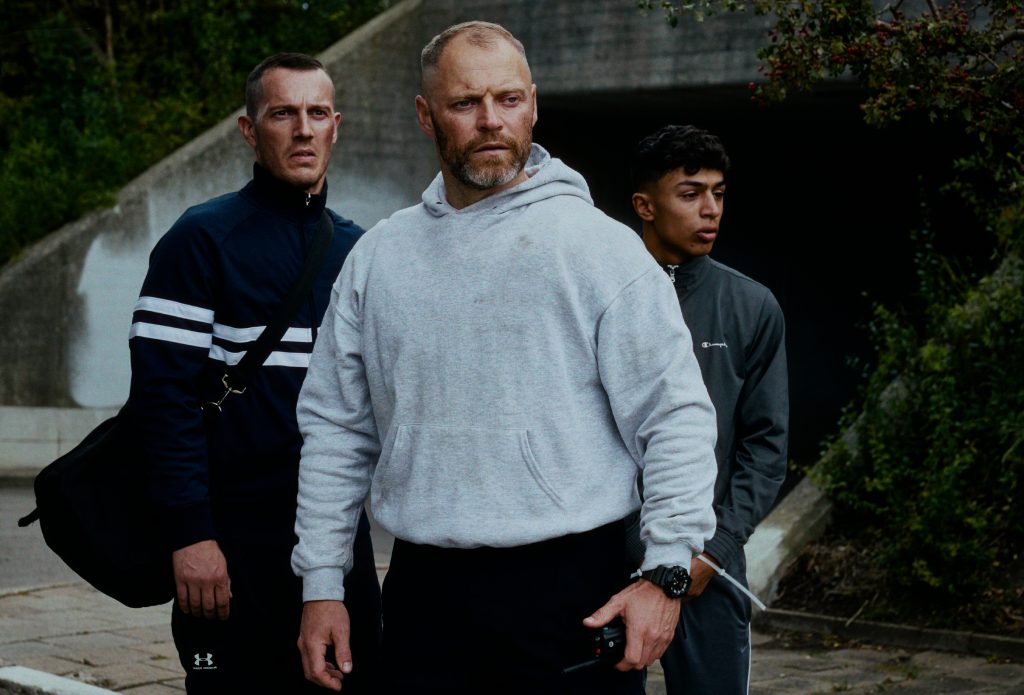April 23, 2021
by Carla Hay

Directed by Nikole Beckwith
Culture Representation: Taking place in San Francisco, the dramedy film “Together Together” features a predominantly white cast of characters (with some Asians, Latinos and African Americans) representing the middle-class.
Culture Clash: A middle-aged bachelor hires a surrogate to carry his first child, and the two sometimes have conflicts over his controlling and neurotic ways during the pregnancy.
Culture Audience: “Together Together” will appeal primarily to people who are interested in seeing a unique and sometimes comedic spin on society’s stereotypes of single fathers and surrogates.

“Together Together” pokes fun at and exposes a lot of preconceptions that people might have of gender roles, when it comes to people who choose to start a family without a partner and what it means to be a pregnancy surrogate in this situation. Written and directed by Nikole Beckwith, the movie adeptly combines comedy and drama without reducing the characters to becoming punchlines or melodramatic caricatures. Patti Harrison stands out for her winning performance as a conflicted 26-year-old named Anna, who decides to become a pregnancy surrogate and finds out that she’s not the only person in the surrogacy arrangement who has to deal with gender biases.
That’s because Anna is a surrogate for someone who typically doesn’t hire a surrogate to become a first-time parent: a heterosexual, never-married bachelor in his 40s who isn’t waiting to find his soul mate/life partner to start a family. This 45-year-old bachelor is named Matt (played by Ed Helms), and he and Anna both live in San Francisco, which makes it easier for them to see each other during the pregnancy. However, living in the same city also makes it easier for neurotic Matt to try to meddle in Anna’s life and control how she lives during the pregnancy.
Matt has a well-meaning tone to his control-freak ways, so he’s not as irritating in the movie as he could be. And certainly, Helms is skilled at playing an awkward nerd to comedic effect, since he’s been typecast in doing this type of character for most of his on-screen roles. What makes “Together Together” so entertaining to watch is the chemistry between Harrison and Helms as Anna and Matt. At first, Matt and Anna appear to be a mismatch, but they end up finding that they have a lot in common when it comes to feeling like misfits in their own families.
“Together Together” begins with Matt (who is an app developer) interviewing Anna (who’s a coffee shop barista) for the surrogacy arrangement. The conversation is clearly uncomfortable for both of them, but they try to make the best out of the situation without offending the other person. Because most people watching “Together Together” already know that Anna was chosen for this surrogacy arrangement, the movie doesn’t waste time with contrivances such as Matt interviewing other candidates.
During the interview, Matt asks Anna: “Have you ever stolen anything?” Anna replies, “Pens.” Matt then asks, “What’s the worst thing you’ve ever done?” Anna says, “That’s private.” His next question is, “Are you religious?” Her reply: “No. My family is, but we’re not close.”
When Matt asks Anna why she wants to be a pregnancy surrogate for him, Anna says, “This appeals to me because I know it’s not the best thing in the world to be alone.” As soon as she says it, Anna gets flustered because she knows that remark comes across as judgmental, so she apologizes profusely for making this potentially offensive remark and tries to clarify.
“I meant being alone isn’t a bad thing,” Anna comments. “I meant if family is important to someone, they should be able to make one. Plus, [I want] the money, not in a bad way. Putting a little karma in the bank never hurt anyone.” This back-and-forth mumblecore-like banter goes on for a few more minutes. And when it’s time for Anna to ask Matt any questions, she asks, “What’s the worst thing you’ve ever done?” And then, the scene ends.
It sets the tone for the rest of the movie, which divides its screenplay’s three acts according to each trimester of Anna’s pregnancy. In case viewers don’t know, the movie literally spells it out in title cards: “First Trimester,” “Second Trimester” and “Third Trimester.” Various people come and go in the movie, but Anna and Matt remain the central focus.
As Matt and Anna get to know each other, so too does the audience. Matt finds out early on in their relationship that Anna gave birth to a child (she won’t say what gender) when she was was 17 or 18 years old. Anna dropped out of high school because of the pregnancy, and she gave the child up for adoption. It was a closed adoption, so she has no idea where the child is now or who adopted the child. And she doesn’t want to know.
Anna doesn’t want to know the gender of the child she’s carrying for Matt. And when her pregnancy starts to show, she also doesn’t want to tell people why she got pregnant and who the father is. Why all the secrecy?
It becomes obvious that Anna has unresolved issues about her first pregnancy because of how it affected her relationship with the rest of her family, which includes her parents and her sister, who are not seen in the movie. It’s inferred that her family members live in an unnamed U.S. state that’s far away from California. In her interview with Matt, Anna said that her parents are religious, so viewers can easily guess how Anna’s parents reacted to Anna being an unwed pregnant teenager.
Anna eventually reveals to Matt that her parents not only disapproved of her teen pregnancy but they also angrily disagreed with her decision to give the child up for adoption. Based on some other things that Anna says about her family, it seems as if her parents thought it would have been better for Anna or someone in their family to raise the child. Later in the movie, Anna gets a call from her mother that leads Anna to make a decision that Anna didn’t expect to make.
Matt incorrectly assumes that Anna is pro-life because she didn’t have an abortion for her teen pregnancy, but Anna tells him that she’s actually pro-choice. There are several instances where Matt goes out of his way to try to say “politically correct” things to make Anna feel more at ease (for example, he announces in a pregnancy meditation group that they’re both feminists), but many times he ends up saying something that makes things more awkward.
Anna says she eventually got her GED and a college associate’s degree, but one of the reasons why she wants the surrogacy fee money (the movie shows she got paid $15,000) is because she wants to get bachelor’s and master’s degrees in hospitality. She found a university in Vermont that will allow her to get these degrees on an accelerated basis. As for her love life, Anna’s most recent relationship was with a guy named Jason, and he broke up with her for reasons that aren’t revealed.
Unlike Anna, Matt is close to his family. His parents Marty (played by Fred Melamed) and Adele (played by Nora Dunn) got divorced and are now remarried to other people. Matt’s younger brother Jacob (played by Timm Sharp) and Jacob’s wife Liz (played by Bianca Lopez) have two daughters together under the age of 3. They all live in the San Francisco area, so they get to see each other on a regular basis.
Marty, Jacob and Liz are happy for Matt and his impending fatherhood, while Adele is suspicious and judgmental about the surrogacy arrangement. Marty’s wife Dana (played by Terri Hoyos) and Adele’s husband Carson (played by Tucker Smallwood) are also supportive of Matt’s parenthood by surrogate pregnancy. Anna eventually meets all of these family members. As for Matt’s love life, Matt tells Anna that he was in a relationship for eight years with a woman he thought he might marry and start a family with, but the relationship didn’t work out.
Matt and Anna have their first major conflict in the first trimester, when Matt finds out that Anna had sex with a guy named Bryce (played by Evan Jonigkeit), whom Anna describes as probably a fling. Matt shows a very old-fashioned and ignorant side to him when he acts shocked and outraged that Anna could have sex while pregnant. When Matt meets Bryce for the first time, it’s after Bryce spent the night with Anna. Matt blurts out to Bryce and Anna: “Did you guys just fuck?”
It’s so rude and so socially clueless. Matt’s harsh reaction to Anna having a sex life while pregnant predictably leads to an argument. And that leads to a scene in an obstetrician’s office where Matt has to have it explained to him that it’s generally safe for a pregnant woman to have sex, unless she’s been told by a doctor that she can’t have sex for medical reasons. Matt is presumably well-educated as someone who works in the tech industry, but he’s woefully ignorant about a woman’s anatomy during pregnancy.
Matt tries to bring up a clause in the surrogacy contract that prohibits Anna from engaging in dangerous acts while pregnant, with Matt saying that sexual intercourse can fall under that clause. However, Anna and their obstetrician Jean (played with scene-stealing sarcasm by Sufe Bradshaw) shut Matt down with his extremely uptight reactions to the idea that Anna can’t have a sex life while pregnant. Although Matt’s reaction is over-the-top, it’s the movie’s way of pointing out how some people have sexist attitudes by believing pregnant women’s sexual needs are supposed to disappear during pregnancy.
“Together Together” mines some pregnancy rituals for some laughs and satire about people’s attitudes about gender roles in parenthood. Matt and Anna attend a pregnancy mediation class, where the so-called open-minded teacher (who tries to look like a New Age guru) is condescending and judgmental when she finds out that Anna is a single woman who is a surrogate. And when people find out that Matt and Anna aren’t a couple, Matt gets more credit and praise than Anna for being committed to going to these classes.
In their separate surrogacy support group sessions (Anna is in a group for for women, Matt is in a group for men), Matt is the only man in his group who is unmarried or without a partner/co-parent. He gets surprised reactions, but they’re not as insulting as some of the things that Anna experiences. There are straight and gay couples represented in the sessions for the support groups, meditation and childbirth preparation classes that Anna and Matt attend. As for how Anna and Matt are able to spend so much time attending all these classes and counseling sessions, it’s implied in the movie that Matt works from home, and Anna’s job at the coffee shop is part-time.
Anna experiences other casual forms of sexism, when she notices that people treat her in a more dismissive or judgmental manner when they find out that her pregnancy is a surrogate pregnancy. But she notices that when people find out that Matt is a single man who hired a surrogate, people react by saying it’s very progressive and “brave.” The message is clear with people who have this attitude: There’s still a stigma attached to being a pregnant woman who’s not married or without a partner, compared to being a pregnant woman who’s married or who has a partner.
Anna also has to experience the rudeness of over-enthusiastic people who touch her pregnant belly without permission. And then, by her third trimester, there are the people who impolitely comment on how “big” Anna is. It’s the movie’s way of showing that some people are insensitive to the fact that pregnant women already know they’ve gained weight and they don’t need it pointed out to them in a body-shaming way, even if the commenter didn’t intend to be offensive. And then there are people (such as Matt’s mother Adele) who say that Anna must be that big because the baby is probably a boy.
Meanwhile, the gender discrimination that Matt experiences isn’t as embarrassing. After people get over the shock that he hired a surrogate and he wants to be a single father, they generally think that what he’s doing is somehow groundbreaking. It helps that he lives in a liberal city such as San Francisco. “Together Together” would have been a very different (and possibly more interesting) movie if Anna and Matt lived in an area that wasn’t so open-minded and accepting of their surrogacy arrangement.
Compared to Anna, Matt doesn’t have as many challenges during this pregnancy. One of Matt’s biggest “problems” is that he can’t find any advice books on being a single father who hires a surrogate, because most books about being a single father have to do with being widowed, divorced or fighting for child custody. Matt goes all-out in preparing for his child, including buying a book that gives in-depth analysis of every conceivable color to paint a baby’s bedroom and how each color might psychologically affect the child. And, as expected, because he’s kind of an obsessive control freak, Matt wants to monitor and judge everything that Anna is eating and drinking while she’s pregnant.
It’s implied that because of the traumatic experience that Anna had with her teen pregnancy, she doesn’t want to know the gender of the child she’s carrying for Matt. Matt wants to know the gender before the baby is born. And so, he and Anna argue a little about it during an ultrasound appointment. Meanwhile, obstetrician Jean witnesses a lot of this bickering and tries not to say out loud what she’s thinking, but it’s written all over her face.
Eventually, Matt decides that if he found out the gender, it would be too hard for him to keep it a secret, so he goes along with Anna’s wish for him to not find out until the baby is born. Matt also promises that he won’t tell Anna the gender of the child after she gives birth. Matt will be the one to name the child after the baby is born.
But while Anna is pregnant, they both agree that they should give the child a gender-neutral name. There’s a comical segment where Anna and Matt go through a series of names. They disagree on and reject several names until they eventually decide to call the unborn child Lamp.
In addition to their respective surrogacy support groups, Anna and Matt get surrogacy counseling from a non-judgmental therapist named Madeline (played by Tig Notaro), who doesn’t do much but listen to Anna and Matt’s neurotic rambling. Anna also confides in a sassy barista co-worker named Jules (played by Julio Torres), who is in his early 20s, openly queer (he dates men and women), and is apparently Anna’s closest friend. Jules is one of the few people whom Anna told that her pregnancy is a surrogate pregnancy and that Matt is the biological father. Jules, who is very opinionated, warns Anna about the complications of getting emotionally involved with Matt, whom Jules eyes suspiciously when Matt visits the coffee shop.
Anna and Matt’s initial discomfort with each other evolves into a deeper understanding of each other. In their own separate ways, they experience prejudice and misunderstandings from other people about their unusual surrogacy situation. And how they navigate their relationship, while coming to terms with how this surrogate pregnancy will change them, makes this movie work so well.
But as Anna and Matt become friends, Anna feels conflicted and confused over how attached she should become to someone who will be raising a child whom she doesn’t want to know. And when she attends a baby shower that Matt has thrown for himself (the party was Anna’s idea), Anna gets an eye-opening experience on how she’s perceived by the people he’s closest to in his life. Instead of the party guests remembering Anna’s name, they call her “the surrogate.” While Matt has people congratulating him at the party, she’s often ignored.
“Together Together” could have been a very gimmicky movie, but it’s held together by witty dialogue and truthful satires. One of the movie’s main intended takeaways is how much women bear the biggest brunt of indignities when it comes to pregnancies. And even though Anna and Matt end up becoming friends, there’s still an unbalanced power dynamic between them because he’s paying her to have his child and paying all of her pregnancy expenses.
When they hang out together, Matt is the one who usually decides what they do (they end up watching every episode of the sitcom “Friends”) and he sometimes acts like a know-it-all. He’s shocked that Anna knew very little about “Friends” before she met him. It’s as if Matt can’t take into account that a lot of people don’t really watch TV and are unaware of all the characters in popular TV shows. And so, he insists that he and Anna will watch every episode of “Friends.”
Anna is also acutely aware of the age difference between herself and Matt, who doesn’t seem to think their nearly 20-year-age gap is that big of a deal. (It’s probably because Matt is emotionally immature in a lot of ways.) This leads to Anna going into a monologue about Woody Allen that has to be seen in the movie to be believed. People will either laugh and/or cringe at this monologue.
“Together Together” has some sharp observations of how well-intentioned men, even those who think that they’re “feminists,” can still have patriarchal and possessive attitudes over pregnant women’s bodies. For example, Matt (who thinks he’s a progressive liberal) was quick to try to use his surrogate contract with Anna as a legal way to stop Anna from having sex while she was pregnant. Although he ultimately failed to police Anna’s sex life, the fact that he wanted to doesn’t make it any less alarming.
Ultimately, “Together Together,” like the title suggests, is not about a battle of the sexes. It shows with a lot of amusing charm how people in unusual pregnancy situations can overcome fears and prejudices, or at least cope in the best way that they can. And if an unexpected friendship can come out if it, that’s an added bonus.
Bleecker Street released “Together Together” in U.S. cinemas on April 23, 2021. The movie’s digital and VOD release date is on May 11, 2021.



